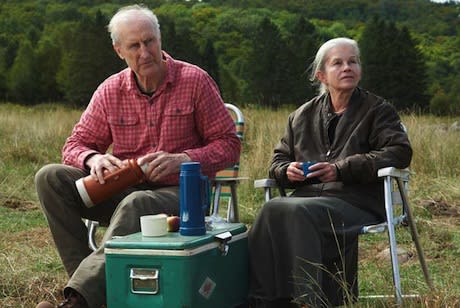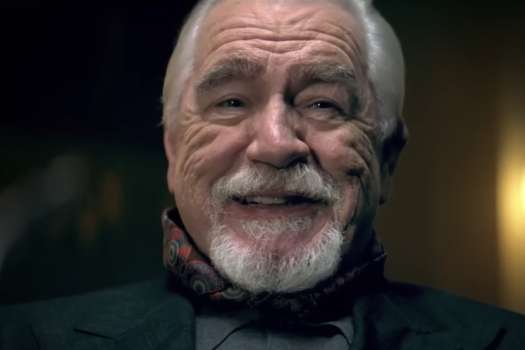Though his auteur trajectory treads dangerously close to twee Canadian Heritage propaganda, having a provincial vibe in its humble quest to tell (often true) stories of unlikely minor local heroes, director Michael McGowan isn't entirely removed from a practical presentation of national identity.
Ignoring the clumsy assemblage of garish nationalistic clichés in Score: A Hockey Musical, his works have attempted to make accessible and clear the melancholic, oddly passive Canadian disposition in featuring characters that fight back when necessary, trying to establish control over things beyond their power. Their plight is often that their hesitance and avoidance — not seizing opportunity when it's first presented — creates a partially self-imposed and inescapable conundrum that mortality, change and the fleeting nature of memory, as perpetuating the ego, ultimately impose.
This is, in broad terms, the crossroads at which rural New Brunswick farmer Craig Morrison (James Cromwell) stands. Unable to sell his berries due to recent regulatory changes in refrigeration and handling standards, he's left frustrated, realizing the potential futility of adapting when well into his 80s.
This early metaphor for change as an imposing force is further compounded when wife Irene (Geneviève Bujold) displays early symptoms of dementia, forgetting names and wandering off on her own. Having put off building the smaller house of her dreams for so long, Craig rushes the project, using unconventional methods, which incites the fury of bureaucrats that require licenses, inspections and incidental costs for every step of his personal quest, often coming dangerously close to derailing his last ditch effort to make right his folly of procrastination.
Morrison's frustrations during this process, which are detailed via often trite exposition with a villainous inspector nailing threatening signs to his partially finished house frame, mirror those of losing control over individuality and the calm quotidian he's come to expect. His rage, while externalised and imposed upon the increasingly convoluted nature of social institutions, is, in part, directed at the self for not appreciating what he had or seizing the moments before they started rapidly slipping away.
This rather challenging yet connective human experience is similar to those of Joshua Jackson's character in One Week and, more tenuously, those of Saint Ralph. McGowan continues to assert his interpretation of the Canuck identity as one of limitations and missed opportunities. But rather than dote on these negatives, which in a sense have defined the oft-psychologically distressing and self-destructive nature of the national narrative, he steps back to remind his audience that intimate moments and seemingly minor human connections matter more than heroism or larger-than-life projections of mortal influence.
His characters live on in the memories of others, similar to how true-life stories like these, which are accessible to a broader audience, demonstrate the significance of individuals that made minor, metaphorically rich strides during their time on Earth.
In making his films rather saccharine and emotionally contrived, these concepts tend to present themselves rather literally and a tad too on-the-nose, but the right intentions are there, even if those more versed in film might feel slightly patronized by his inherently corny, but often touching style of storytelling.
(Mongrel Media)Ignoring the clumsy assemblage of garish nationalistic clichés in Score: A Hockey Musical, his works have attempted to make accessible and clear the melancholic, oddly passive Canadian disposition in featuring characters that fight back when necessary, trying to establish control over things beyond their power. Their plight is often that their hesitance and avoidance — not seizing opportunity when it's first presented — creates a partially self-imposed and inescapable conundrum that mortality, change and the fleeting nature of memory, as perpetuating the ego, ultimately impose.
This is, in broad terms, the crossroads at which rural New Brunswick farmer Craig Morrison (James Cromwell) stands. Unable to sell his berries due to recent regulatory changes in refrigeration and handling standards, he's left frustrated, realizing the potential futility of adapting when well into his 80s.
This early metaphor for change as an imposing force is further compounded when wife Irene (Geneviève Bujold) displays early symptoms of dementia, forgetting names and wandering off on her own. Having put off building the smaller house of her dreams for so long, Craig rushes the project, using unconventional methods, which incites the fury of bureaucrats that require licenses, inspections and incidental costs for every step of his personal quest, often coming dangerously close to derailing his last ditch effort to make right his folly of procrastination.
Morrison's frustrations during this process, which are detailed via often trite exposition with a villainous inspector nailing threatening signs to his partially finished house frame, mirror those of losing control over individuality and the calm quotidian he's come to expect. His rage, while externalised and imposed upon the increasingly convoluted nature of social institutions, is, in part, directed at the self for not appreciating what he had or seizing the moments before they started rapidly slipping away.
This rather challenging yet connective human experience is similar to those of Joshua Jackson's character in One Week and, more tenuously, those of Saint Ralph. McGowan continues to assert his interpretation of the Canuck identity as one of limitations and missed opportunities. But rather than dote on these negatives, which in a sense have defined the oft-psychologically distressing and self-destructive nature of the national narrative, he steps back to remind his audience that intimate moments and seemingly minor human connections matter more than heroism or larger-than-life projections of mortal influence.
His characters live on in the memories of others, similar to how true-life stories like these, which are accessible to a broader audience, demonstrate the significance of individuals that made minor, metaphorically rich strides during their time on Earth.
In making his films rather saccharine and emotionally contrived, these concepts tend to present themselves rather literally and a tad too on-the-nose, but the right intentions are there, even if those more versed in film might feel slightly patronized by his inherently corny, but often touching style of storytelling.




